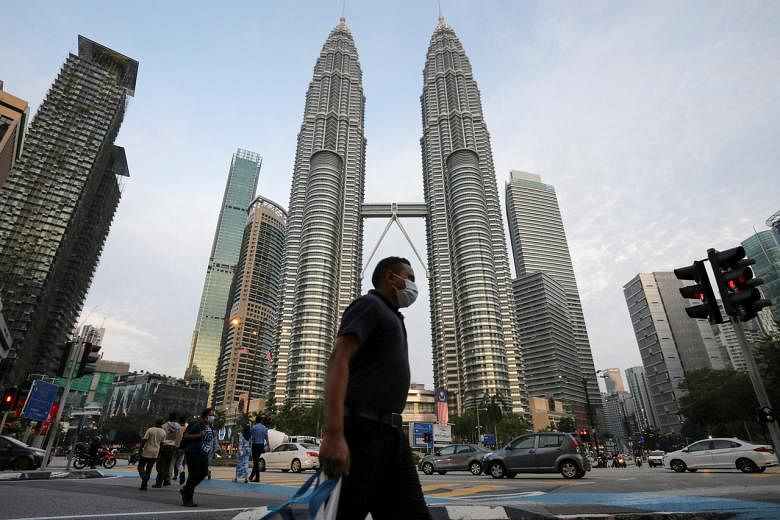KUALA LUMPUR - The Democratic Action Party (DAP), Pakatan Harapan's oldest party in the opposition pact, is once again struggling to shed the anti-Malay tag that has haunted the party for decades after some of its young members ignited a language row in two Malaysian states.
Last month, Mr Chow Yu Hui - the party's assemblyman for Tras, a state assembly seat in Malaysia's largest Peninsular state Pahang - filed an application in court to challenge the state government's directive for mandatory Jawi signboards in Pahang.
The 37-year-old argued that such a rule limits the freedom of choice for the people of the state.
Jawi is the writing of the Malay language using Arabic script.
Mr Chow's decision to take the matter to court was criticised by Islamic youth movement Angkatan Belia Islam Malaysia (ABIM), which said it threatens race relations in Malaysia.
The country's Islamist party PAS described the move as disrespectful of the country's monarchy. Malaysia's monarchs are the head of Islam in their respective states.
Mr Chow's action was also admonished by his own party colleagues, with DAP Youth chief Howard Lee calling the challenge a "trivial matter".
Mr Lee, 37, wrote his tweet in Jawi, winning brownie points on social media for the way he responded to the issue.
Ms Marina Ibrahim, one of the few high-profile Malay politicians in DAP, told Mr Chow to "shut up".
But just as the dust was beginning to settle over the Jawi issue, the party was under the microscope once again last week.
This time after several of its members, led by former Member of Parliament Julian Tan, put up Chinese-language signages on several roads with historic value in the Borneo state of Sarawak.
Sarawak DAP claimed that the road signs previously included Chinese characters, but were changed to only Bahasa Malaysia in recent years by the Kuching City Hall.
The Sarawak state government has branded the act as a form of vandalism, while PAS, part of the ruling Perikatan Nasional coalition, has called for action to be taken against Sarawak DAP's youth arm, which had posted the signages.
Home Affairs Minister Hamzah Zainudin had previously warned that action will be taken against anyone who exploits "language issues" in the country.
This time, the criticism also came from Sarawak Amanah Youth and Sarawak PKR Youth- both DAP's allies in PH.
Sarawak DAP Youth eventually relented and said that it will remove the signages and accept any fine issued for its alleged "vandalism".
But it also filed an application with the Kuching City Hall to have Chinese signages restored.
With 42 seats, DAP is not only the biggest party in PH, but is also outright the party with the most seats in a fragmented Malaysian Parliament.
However, the social democrat party has been beset for years with accusations of being anti-Malay and anti-Islam, labels that have been liberally used by Malaysia's ruling parties Umno and Pas to demonise the Chinese-majority multiracial party.
DAP has also been consistently branded by its political enemies as being a "chauvinist" party that only protects the interests of the Chinese community, who make up a huge bulk of its traditional support base.
The party struggled to shed these labels even after winning federal power for the first time during the 2018 elections.
A string of by-election losses during PH's short stint in power was blamed on the perception that the government was controlled by DAP, according to former premier Dr Mahathir Mohamad.
This ultimately sealed PH's fate as Prime Minister Muhyiddin Yassin led 40 MPs out of PH to form a new government heavily dominated by Malay-based parties.
"Anyone who knows DAP will not be surprised by such (radicals)," said Professor James Chin of University of Tasmania.
This is mostly due to the traditional support base that DAP had retained over the decades, Mr Chin said, before the party's recent focus in recruiting more professionals and also Malay leaders.
"However, I don't think they (the radical group) are very influential in the party. The upper levels within the party believe in multiculturalism," he said.
Mr Chin said that DAP's biggest challenge in growing their multiracial base is the presence of other multicultural parties, especially their PH partners PKR.
Malays who want to join multiracial parties tend to opt for PKR as their composition ratio is more representative of the racial makeup in the country.
Another analyst said that the latest incidents would reinforce the anti-Malay perception that already exists, but said that it is unlikely to have long-term repercussions.
"It will unlikely yield any long-term repercussions other than provide the party's critics with 'political ammunition' to attack DAP, and by extension, Pakatan Harapan.
"The DAP's central leadership acted quickly to reproach Sarawak DAP Youthespecially over the Sarawak issue, to which they largely complied with," said Mr Shazwan Mustafa Kamal, a senior associate at Vriens and Partners, a government regulatory affairs and political risk consultancy firm.
Mr Shazwan said that the two incidentsunderscored DAP's ongoing challenge in shedding the anti-Malay image, while also laying bare the divisions within the party.
"On one hand, the party tries very hard to appeal to a multiracial audience - hence DAP's nurturing of young Malay members with leadership potential. Many of its branches in the Klang Valley are diverse, with members from many ethnic communities."
"But at the same time, there is a faction within the party that believe that DAP must champion Chinese rights, as many voters have been backing the party for the last few general elections.
"These form a sizeable chunk of DAP's grassroots outside of the Klang Valley," Mr Shazwan said.


